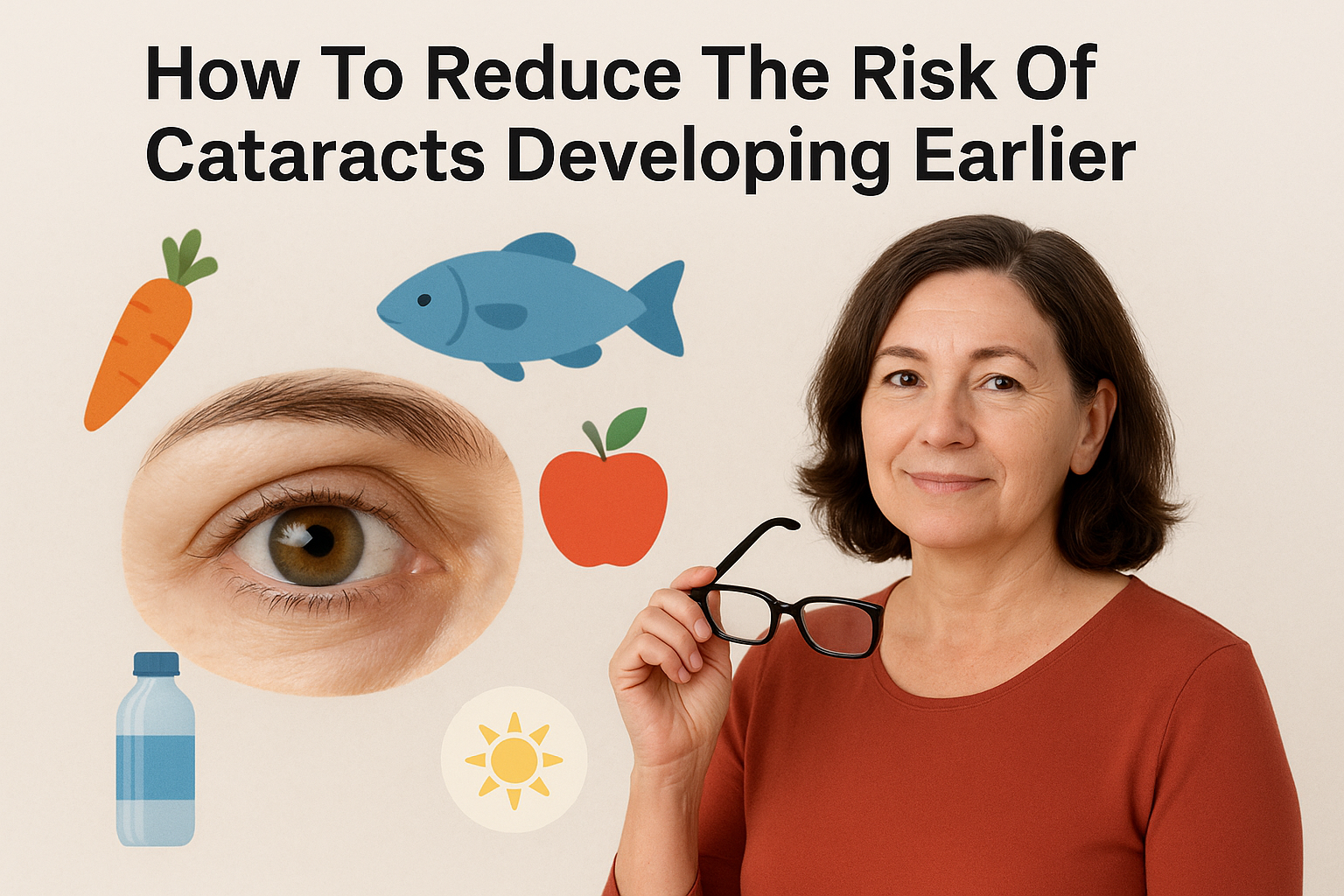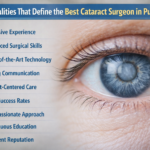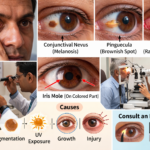Cataracts are one of the most common eye conditions that can affect vision and daily life. Dr. Ramesh Murthy, a renowned eye specialist at Axis Eye Clinic, emphasizes that while cataracts are usually age-related, they can sometimes develop much earlier due to lifestyle, genetics, or medical conditions. Imagine waking up one day to find the world around you blurred or hazy—this is how cataracts can impact life if not prevented or treated on time. The good news is that by making healthy choices, getting regular check-ups at the Best Eye Clinic In Pune, and following expert advice, you can significantly reduce the risk of cataracts developing prematurely.
Although most cataracts are related to aging, they can also be influenced by other factors such as genetics, diabetes, and excessive sun exposure. Globally, cataracts are among the leading causes of vision loss.
Common symptoms include poor night vision, glare from lights, and faded or yellowed colors. Though cataracts can be effectively treated with surgery, understanding how they form helps in prevention and early care.
Lifestyle choices—like smoking, excessive alcohol use, and unprotected exposure to UV rays—also raise risks. Certain medications, such as long-term corticosteroid use, can contribute to cataracts as well.
Even obesity and uncontrolled high blood pressure may heighten your chances. Recognizing these risk factors allows you to make proactive decisions about protecting your eye health.
Quitting smoking is critical, as tobacco is strongly linked to cataracts and other eye diseases. Similarly, limiting alcohol consumption reduces oxidative stress on the eyes.
Managing chronic illnesses such as diabetes and high blood pressure through regular check-ups, medication, and lifestyle adjustments can also protect vision.
These small yet consistent steps play a powerful role in keeping cataracts at bay.
Omega-3 fatty acids from fish and flaxseeds support healthy eyes, while leafy greens such as spinach and kale provide lutein and zeaxanthin—antioxidants that guard against cataracts.
Hydration is equally important, as adequate water intake helps maintain moisture in the eyes. Cutting down on processed foods and sugars also reduces inflammation that could harm eye health.
A colorful, balanced diet ensures your eyes receive the nutrients they need.
Consulting the Best Eye Specialist in Pune ensures personalized guidance and timely care. For those already diagnosed, follow-ups help track the progression and plan the right treatment.
Early detection is key to better outcomes, making eye exams an essential part of preventive care. Visiting the Best hospital for cataract surgery in Pune ensures you’re in the right hands if treatment is required.
Acupuncture and relaxation techniques are believed to improve circulation and overall well-being. Healthy habits such as exercise, hydration, and balanced nutrition also provide long-term benefits.
However, it’s crucial to seek expert advice. Consulting Dr. Ramesh Murthy at Axis Eye Clinic ensures safe, evidence-based care tailored to your needs.
Regular eye check-ups with the Leading Eye Specialist in Pune make it easier to detect problems early. If treatment is necessary, consulting the Best Cataract Surgeon in Pune, the Best eye surgeon in Pune, or even the Best cataract surgeon near me ensures expert, personalized care.
For complete eye health, choosing the Best eye Hospital in Pune gives you access to advanced technology and trusted specialists.
By following these steps and seeking timely guidance from experts like Dr. Ramesh Murthy, you can protect your vision and enjoy clearer sight for years to come.
Understanding Cataracts
Cataracts occur when the natural lens of the eye becomes cloudy, blocking light and leading to blurry or dim vision. The process is gradual and may go unnoticed in the beginning.Although most cataracts are related to aging, they can also be influenced by other factors such as genetics, diabetes, and excessive sun exposure. Globally, cataracts are among the leading causes of vision loss.
Common symptoms include poor night vision, glare from lights, and faded or yellowed colors. Though cataracts can be effectively treated with surgery, understanding how they form helps in prevention and early care.
Factors That Increase The Risk of Developing Cataracts
Several factors can increase the likelihood of cataract formation. Age remains the most significant, but family history also plays a role. Medical conditions such as diabetes and hypertension may accelerate cataract development. Additionally, antioxidants play a role in preventing cataract formation by protecting the eyes from oxidative stress.Lifestyle choices—like smoking, excessive alcohol use, and unprotected exposure to UV rays—also raise risks. Certain medications, such as long-term corticosteroid use, can contribute to cataracts as well.
Even obesity and uncontrolled high blood pressure may heighten your chances. Recognizing these risk factors allows you to make proactive decisions about protecting your eye health.
Lifestyle Changes to Reduce the Risk of Cataracts
Adopting healthier habits can go a long way in protecting your eyesight. Staying physically active improves blood circulation, which supports overall eye health.Quitting smoking is critical, as tobacco is strongly linked to cataracts and other eye diseases. Similarly, limiting alcohol consumption reduces oxidative stress on the eyes.
Managing chronic illnesses such as diabetes and high blood pressure through regular check-ups, medication, and lifestyle adjustments can also protect vision.
These small yet consistent steps play a powerful role in keeping cataracts at bay.
Diet and Nutrition for Healthy Eyes
Eating a nutrient-rich diet helps maintain good vision. Vitamins A, C, and E found in foods like carrots, citrus fruits, and almonds are particularly important.Omega-3 fatty acids from fish and flaxseeds support healthy eyes, while leafy greens such as spinach and kale provide lutein and zeaxanthin—antioxidants that guard against cataracts.
Hydration is equally important, as adequate water intake helps maintain moisture in the eyes. Cutting down on processed foods and sugars also reduces inflammation that could harm eye health.
A colorful, balanced diet ensures your eyes receive the nutrients they need.
Importance of Regular Eye Exams
Routine eye exams are not just about checking vision—they are vital for early detection of cataracts and other conditions. Regular visits allow specialists to monitor changes and intervene before issues worsen.Consulting the Best Eye Specialist in Pune ensures personalized guidance and timely care. For those already diagnosed, follow-ups help track the progression and plan the right treatment.
Early detection is key to better outcomes, making eye exams an essential part of preventive care. Visiting the Best hospital for cataract surgery in Pune ensures you’re in the right hands if treatment is required.
Alternative Treatments for Cataracts
While surgery is the only definitive treatment for cataracts, many people explore complementary methods to maintain eye health. Herbal remedies like bilberry and ginkgo biloba, rich in antioxidants, may support vision.Acupuncture and relaxation techniques are believed to improve circulation and overall well-being. Healthy habits such as exercise, hydration, and balanced nutrition also provide long-term benefits.
However, it’s crucial to seek expert advice. Consulting Dr. Ramesh Murthy at Axis Eye Clinic ensures safe, evidence-based care tailored to your needs.
Taking Steps Towards Preventing Cataracts
Preventing cataracts begins with awareness and proactive care. Lifestyle changes such as quitting smoking, wearing UV-protective eyewear, managing chronic conditions, and maintaining a healthy diet all reduce risk.Regular eye check-ups with the Leading Eye Specialist in Pune make it easier to detect problems early. If treatment is necessary, consulting the Best Cataract Surgeon in Pune, the Best eye surgeon in Pune, or even the Best cataract surgeon near me ensures expert, personalized care.
For complete eye health, choosing the Best eye Hospital in Pune gives you access to advanced technology and trusted specialists.
By following these steps and seeking timely guidance from experts like Dr. Ramesh Murthy, you can protect your vision and enjoy clearer sight for years to come.






